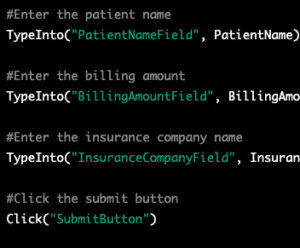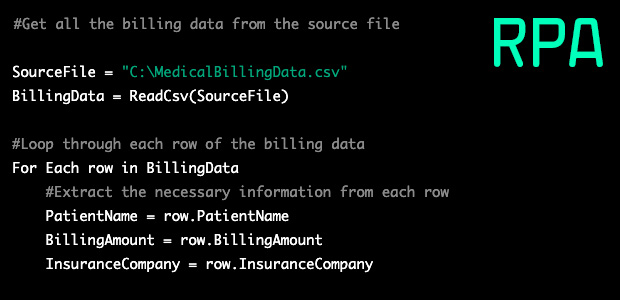RPA has Transformed the Medical Billing Industry
 Medical billing is a crucial aspect of the healthcare industry, responsible for accurately tracking and processing payments for patient care and services. In recent years, advances in technology have led to the development of Robotic Process Automation (RPA) in Healthcare, which has been hailed as a game-changer for many industries, including healthcare. In this article, we will explore the efficacy of RPA in medical billing and how it has transformed this industry.
Medical billing is a crucial aspect of the healthcare industry, responsible for accurately tracking and processing payments for patient care and services. In recent years, advances in technology have led to the development of Robotic Process Automation (RPA) in Healthcare, which has been hailed as a game-changer for many industries, including healthcare. In this article, we will explore the efficacy of RPA in medical billing and how it has transformed this industry.
Firstly, let’s define RPA. Simply put, RPA is a technology that automates repetitive, routine tasks by mimicking human actions. It is designed to increase efficiency, reduce errors, and free up employees’ time to focus on higher-level tasks. In medical billing, RPA has proven to be an effective tool for automating tasks such as data entry, claim submissions, and payment processing.
Benefits of RPA
One of the main benefits of RPA in medical billing is improved accuracy. By automating data entry and reducing human intervention, the likelihood of errors and inaccuracies is greatly reduced. This not only ensures that patient billing is correct, but it also helps to avoid potential legal issues that can arise from incorrect billing. In addition, RPA can also help to reduce claims denial rates, as it can identify and rectify errors before claims are submitted.
Another major benefit of RPA in medical billing is increased efficiency. By automating routine tasks, employees are freed up to focus on more complex and higher-level tasks. This not only increases the overall efficiency of the billing process, but it also helps to improve customer satisfaction, as claims are processed more quickly and efficiently. Furthermore, RPA can also be used to streamline processes such as payment collections, helping to reduce the time it takes to collect payments and increasing cash flow for healthcare providers.
Aside from increased accuracy and efficiency, RPA also offers a number of other benefits to medical billing. For example, it can help to reduce the cost of healthcare services, as RPA can be used to automate manual and time-consuming processes, reducing the need for human labor and associated costs. Additionally, RPA can also be used to improve data security and privacy, as it can be programmed to comply with regulations such as HIPAA.
The efficacy of RPA in medical billing is undeniable. RPA has proven to be a valuable tool for the medical billing industry. By automating repetitive and routine tasks, reducing errors, increasing efficiency, and improving data security, RPA has transformed the way medical billing is performed, bringing many benefits to healthcare providers and their patients. As technology continues to evolve, it is likely that the use of RPA in medical billing will only increase, bringing even more improvements to this critical aspect of the healthcare industry.
How Robotic Process Automation is Replacing Manual Entry in Medical Billing
 Medical billing is a critical aspect of the healthcare industry that requires accuracy, efficiency, and attention to detail. For many years, medical billing has relied heavily on manual entry to process payments, track claims, and manage patient billing information. However, with the advent of Robotic Process Automation (RPA), this manual approach is changing. In this section, we will explore how RPA is replacing manual entry in medical billing.
Medical billing is a critical aspect of the healthcare industry that requires accuracy, efficiency, and attention to detail. For many years, medical billing has relied heavily on manual entry to process payments, track claims, and manage patient billing information. However, with the advent of Robotic Process Automation (RPA), this manual approach is changing. In this section, we will explore how RPA is replacing manual entry in medical billing.
RPA is a technology that automates repetitive and routine tasks by mimicking human actions. In medical billing, this technology can be used to automate tasks such as data entry, claim submissions, and payment processing. The goal of RPA in medical billing is to reduce human intervention and increase efficiency, accuracy, and speed.
One of the key ways that RPA is replacing manual entry in medical billing is by reducing errors. When manual entry is performed, it is subject to human error, such as typos, incorrect data entry, or missing information. RPA eliminates this issue by automating data entry, reducing the likelihood of errors, and improving accuracy.
Another way that RPA is replacing manual entry in medical billing is by increasing efficiency. RPA can perform routine tasks much faster than a human, freeing up employees’ time to focus on more complex and higher-level tasks. This not only increases the overall efficiency of the billing process, but it also helps to improve customer satisfaction, as claims are processed more quickly and efficiently.
As previously mentioned, RPA can also be used to streamline processes such as payment collections, reducing the time it takes to collect payments and increasing cash flow for healthcare providers. This not only improves the bottom line for healthcare providers, but it also benefits patients, as payments are processed more quickly and efficiently.
Aside from reducing errors and increasing efficiency, RPA also offers a number of other benefits to medical billing. For example, it can help to reduce the cost of healthcare services, as RPA can be used to automate manual and time-consuming processes, reducing the need for human labor and associated costs. Furthermore, RPA can also be used to improve data security and privacy, as it can be programmed to comply with regulations such as HIPAA.
Short Use Case: RPA Deployment for Insurance Coverage Verification
A large hospital client have a team of employees who are responsible for verifying insurance coverage for patients before their procedures. This process involved manual checks on various insurance company websites, phone calls, and email correspondences to confirm coverage.
To improve the efficiency of this process, the hospital implemented our RPA solution. Our RPA tool automates the verification of insurance coverage by logging into the relevant insurance company websites, checking the coverage status, and aggregating the information into a central database. This has significantly reduced the time and effort required to verify insurance coverage, freeing up our client’s staff to focus on more important tasks and providing a better experience for patients.
This use case shows how RPA can streamline manual, repetitive, and time-consuming tasks in the healthcare industry, allowing healthcare providers to provide more efficient and effective care to their patients.
Summary: RPA Excellence in Medical Billing
RPA is quickly replacing manual entry in medical billing, bringing many benefits to healthcare providers and their patients. Through automating routine tasks, improving accuracy, increasing efficiency, reducing costs, and improving data security, RPA is transforming the way medical billing is performed. The use of RPA in medical billing will only increase, bringing even more improvements to this critical aspect of the healthcare industry.
Contact Medwave to discuss how we can greatly improve your healthcare group’s data entry, claim submissions, and payment processing protocol through Robotic Process Automtion (RPA).

